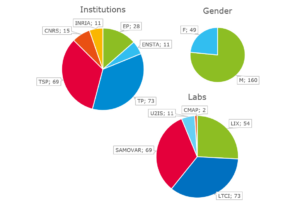Home
Disciplinary research at Institut Polytechnique de Paris is based on the expertise of its founding schools. Computer science, data and artificial intelligence (CSDAI) is one of ten disciplinary departments bringing together top researchers and PhD students at state-of the art laboratories and infrastructures.
The CSDAI department has 211 permanent members (from IP Paris engineering schools, CNRS and INRIA) and around 300 PhD students (including 90 working with companies in the context of ANRT-CIFRE). It is one of the best computer science department in Europe (according to QS 2022, ranked #9 in Europe and first in France for the computer science and information systems subject).

Its members belongs to several research laboratories, LIX, LTCI, Samovar, U2IS and CMAP. The CSDAI department also contributes to interdisciplinary centers of IP Paris, CIEDS, E4C, and Hi!PARIS.
Its mission is to coordinate research and master, PhD track and PhD programs in computer science, data and artificial intelligence.
Research
The development of information technology has profoundly changed our society and given rise to new disciplines such as the processing of big, heterogeneous data and artificial intelligence to help produce new knowledge. In our digital society, research has never been so crucial in order to develop new methods and algorithms with wide-ranging impacts – whether on industry, the economy, sustainable development, or in other disciplinary areas where these new tools are needed to more fully analyze the data produced by their experiments and simulations.
Fundamental and applied research in computer science, data and artificial intelligence at the Institut Polytechnique de Paris aims to:
- Contribute to the foundations of computer science with a particular focus on interactions with mathematics,
- Develop powerful systems and algorithms to provide the basis for an efficient, reliable and secure digital world,
- Develop algorithms and statistical processing methods for learning, optimization and data analysis,
- Explore and roll out new AI applications for industry and society.
The main research topics of the CSDAI department are:
- Fundamentals of computer science, semantic, algorithmic verification, Combinatorics, computer algebra
- Data science, machine learning, artificial intelligence
- Digital trust, cybersecurity
- Robotics, Computer graphics; audio and video computing; virtual and augmented reality; interaction
- Next Generation Digital Infrastructure, networks (5G, IoT), distributed systems, cloud computing
- Computer science for biology and health
Teaching
The CSDAI department of IP Paris is in charge of coordinating all teaching activities in computer science, data and artificial intelligence. Its first constructions are the master and PhD tracks in computer science.
The goal of this program is to teach students the theoretical foundations and the various concepts and tools of computer science. The program offers a vast coverage of different areas, including systems, networks, artificial intelligence, and cybersecurity, as well as algorithms and human-computer interaction. The program has a focus on research, and aims to integrate students into research labs through projects and during the master’s thesis, in order to prepare them for a PhD
